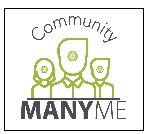ManyMe: Difference between revisions
No edit summary |
No edit summary |
||
| Line 1: | Line 1: | ||
{{Project | {{Project | ||
|acronym=Many-Me | |acronym=Many- Me | ||
|logo= Manyme.jpg | |logo= Manyme.jpg | ||
|project_title=[[Social Interactive Care System to support the wellbeing of people living with dementia | |project_title=[[Social Interactive Care System to support the wellbeing of people living with dementia]] | ||
|contract_number= | |contract_number= | ||
|coordinator=Drimpy | |coordinator=Drimpy | ||
| Line 11: | Line 11: | ||
|website=http://many-me.eu}} | |website=http://many-me.eu}} | ||
'''Many-Me Service types''' | ''' | ||
== Many-Me Service types == | |||
''' | |||
'''Patient to patient services''' | '''Patient to patient services''' | ||
Revision as of 01:36, 26 April 2018
|
Many-Me Service types
Patient to patient services
These services will enable elderly with early dementia to meet-up, virtually or in real life and do empowering activities together. The elderly will be able to stay connected with each other, encouraged by Many-Me to various activities (e.g. watch a film together, take a memory quiz). The valuable input from end-users (Work Package 1) will enable determining which patient services are most important and useful.
Patient to caregiver services and carer to patient
On one side caregivers will be able to monitor (in a non-invasive way) patients indoor and outdoor through a smart bracelet, and communicate with them when needed through the smartphone. On the other side, patients will be able to call for help, ask for advice or services in an easy way by using the same devices. These features work thanks to an innovative smart service called Many-Me Angel. Many-Me Angel is a service of the Many-Me system that allows seniors with mild and medium dementia to make local or regional travels in a safe way when they do activities indoor or outdoor. If an unexpected situation (getting lost, too tired, pain, forgotten pills, etc.) appears, the smartphone helps the user to find a solution. In case the senior and the Angel can’t find a solution, a remote person (caregiver, family or other member of the community, with access at the patient data) can enter in contact with the him and “remote control” him until the situation becomes normal again. Indeed, the remote person can see the senior’s position, its current heading, his last moves, the stream of the smartphone’s camera, and any other information that allows the “helper” to act as if he was next to the senior. It is of course easier to find solutions for a person based at home, that is sitting in front of a bigscreen (for instance to check that a specific medication is available in a pharmacy), than for a panicked senior that is lost outside and that has only the small screen of his smartphone to look for information. But this will be just one of the innovative aspects of our project, to make the Many-Me Angel part of the seniors life and to be able to tackle their fear of getting lost or confused and help them gain the confidence and do outdoor activities as they used to do.
Caregiver to caregiver services – Service developed by EKKOTEK
The platform will be a mobile application for carers (formal/informal). The main scope of the app is to allow carers to have an “assistant” in providing the best care possible. The app will include a scheduling tool that carers can use to help them plan their day care for the patient (e.g alerts for when the pills need to be given). Furthermore, the app will provide experiential information for them to read and learn (tips), deriving from forums where people or other carers discuss. It will also enable the carers to improve their skills and knowledge of the disease by offering them games to play that are specifically tailored for increasing the knowledge regarding dementia and care. Last, it will send psychological boost-ups messages for those ‘hard to get in the mood days’. Through these activities, the formal carers can further develop their skills and increase their employability status while the informal carers (e.g. family members) can feel more confident regarding their knowledge of the disease and the way they can deal with their loved one.
